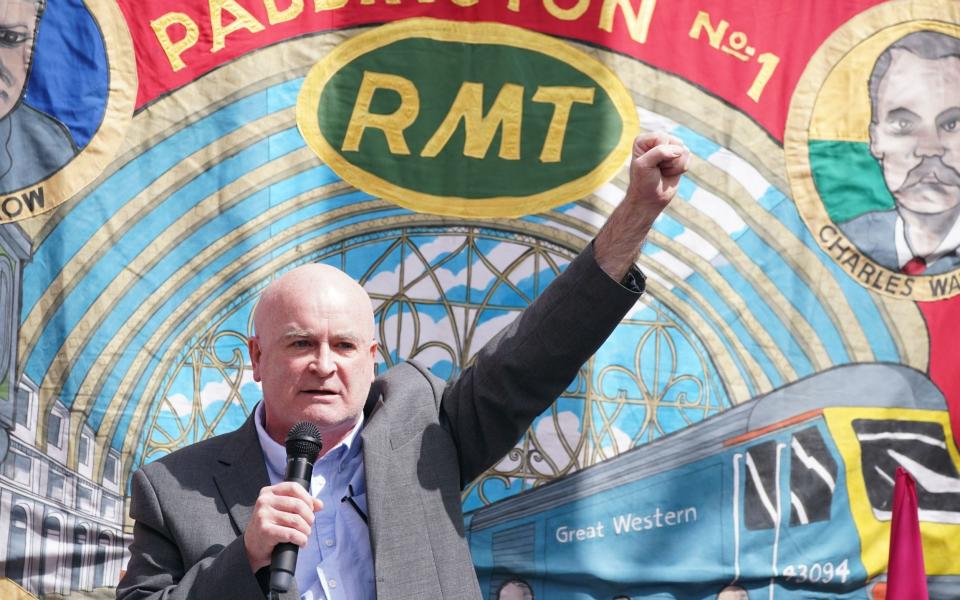Christmas under threat from rail strikes

Supplies of presents in time for Christmas are under threat from a “summer of discontent” on the railways.
Britain’s fragile supply chains risk being thrown into chaos as rail strikes stretch into July and August, bosses say.
More than 600 freight trains run up and down Britain every day carrying billions of pounds of goods – from televisions, clothes, whisky and Christmas decorations, to construction materials, steel, cars and waste paper.
Ministers chose to prioritise rail freight over passenger services last week to avoid supermarkets running out of food and blackouts at large power stations such as Drax.
It meant that a rail freight crisis was largely averted last week as 40,000 workers walked out for three days last week in a row over pay and working conditions.
The timing of the action was also fortuitous, as a surge in shipping containers of goods from Chinese ports following the easing of a Covid lockdown last month has yet to hit Britain’s supply chains.
The Rail, Maritime and Transport union (RMT) is now thought to be targeting the next wave of industrial action at the end of July. General secretary Mick Lynch has a mandate to continue striking for up to six months.
A top rail freight industry figure said: “As the year goes on freight gets busier, particularly containers, so that's the big worry.
“The China surge will come in. And those ships are sailing now.
“It always gets busier as you go into August, particularly when we start seeing the Christmas stuff start to come through. Because obviously if you're selling it in October, you're shipping it in August, September. So the Christmas surge isn't December, it's well ahead of that.”
Another senior rail industry source added: “From a freight perspective, Christmas is literally just around the corner with orders already at sea and heading for our shores. If this strike escalates, then it might not be the Christmas our children are hoping for.”
Grant Shapps, the Transport Secretary said that freight had not been adversely impacted “in the way they [the RMT] may have hoped" over the last week. But John Smith, chief executive of GB Railfreight, one of the largest operators, said navigating last week’s strikes “had been tortuous”.
“It has stretched our resources,” he said. “In order to run 20pc more [services] on the non-strike days, you call in a lot of favours. And that will begin to wear thin.
“A lot depends on what they [trade unions] do next. If they suddenly say they are out for two weeks, Jesus Christ, that’s starting to cause problems.”
Richard Ballantyne chief executive of the British Ports Association, said ports were bracing to be inundated with shipping containers from China in the coming weeks and hoping to avoid the supply chain chaos witnessed on several occasions during the pandemic.
He said: “The resilience planning [by the Government] was more focused on freight than passengers.”
“I don’t want to say it was an ideal time to happen. But it was more convenient than others.
“Moving forward we are going to approach those busy pre-Christmas periods. It could be particularly unhelpful for further strike action then.”
Meanwhile, grassroots campaigners raised fears about the impact of strike action in the weeks and months ahead on supply chains.
John O'Connell, chief executive of the TaxPayers' Alliance said: "Taxpayers will be rightly concerned at the impact that continuing strikes might have on the Christmas season.
“With the railway network already propped up by billions of pounds, and struggling taxpayers squeezed with record tax levels and a cost of living crisis, further funding for big public sector pay rises simply isn’t realistic.”
Mr Shapps this weekend urged the RMT to come back to the negotiating table.
“Rather than standing on picket lines, union representatives should be back around the negotiating table and agree a deal to bring our rail industry into the 21st century,” he said.

 Yahoo Finance
Yahoo Finance 